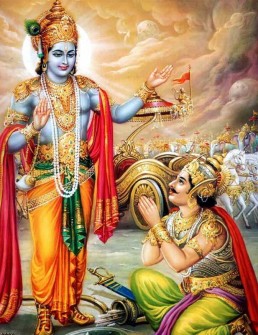Gita Chapter 8 – Verse 21 « »
अव्यक्तोऽक्षर इत्युक्तस्तमाहुः परमां गतिम् ।
यं प्राप्य न निवर्तन्ते तद्धाम परमं मम ॥ ८-२१॥
avyakto’kṣara ityuktastamāhuḥ paramāṃ gatim
yaṃ prāpya na nivartante taddhāma paramaṃ mama 8-21
That which is called the Unmanifest and the Imperishable, that, they say is the Highest Goal (path) . They who reach It never again return. That is My highest abode (state) .
avyaktaḥ = unmanifested; akṣaraḥ = infallible; iti = thus; uktaḥ = is said; taṃ = that; āhuḥ = is known; paramāṃ = the ultimate; gatiṃ = destination; yaṃ = which; prāpya = gaining; na = never; nivartante = come back; tat = that; dhāma = abode; paramaṃ = supreme; mama = My.;

